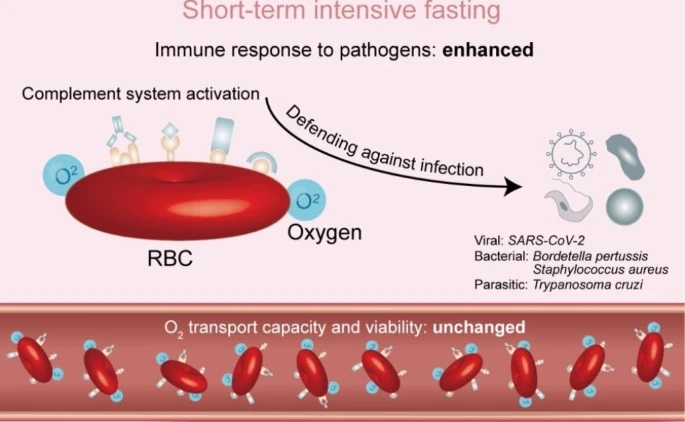Immunology News: Study Uncovers The Immune-Boosting Potential Of Short-Term Intensive Fasting On Red Blood Cells
Nikhil Prasad Fact checked by:Thailand Medical News Team Sep 02, 2023 2 years, 5 months, 1 week, 5 days, 5 hours, 17 minutes ago
Immunology News: Fasting has been practiced for centuries for various reasons, including religious observances, weight management, and health benefits. Recent research conducted at Soochow University in Suzhou, China, has shed new light on the potential immune-boosting effects of short-term intensive fasting (STIF), also known as beego in China, on red blood cells in humans. This study explores how STIF impacts the immune function of red blood cells and its potential applications in enhancing our body's defense against infectious pathogens, with a particular focus on its ability to combat the SARS-CoV-2 virus.
 Graphical Abstract
The Role of Red Blood Cells in Immunity
Graphical Abstract
The Role of Red Blood Cells in Immunity
Traditionally, red blood cells have been primarily associated with the transportation of oxygen throughout the body. However, emerging research has revealed their previously underestimated role in the immune system. Immature red blood cells in newborns were found to have immunosuppressive properties, while mature red blood cells in adults possess a complement system on their membranes, making them capable of binding immune complexes in circulation and delivering them to macrophages for clearance. This process, primarily occurring in the liver and spleen, plays a crucial role in maintaining immune homeostasis in the body. Additionally, red blood cells have been found to interact with various immune cells, suggesting that they play immunomodulatory roles throughout our lives.
The Impact of Fasting on Immune Function
Fasting has been widely studied for its effects on immune function, primarily focusing on the mobilization and redistribution of immune cells, or leukocytes, between the bone marrow and peripheral circulation. For example, fasting in mice has been shown to cause T lymphocytes to relocate from secondary lymphoid organs to the bone marrow, while B cells leave the small intestine's Peyer's patches.
Moreover, fasting can reduce the number of circulating monocytes by preventing their mobilization from the bone marrow, with re-entry into the bone marrow mediated by corticosterone release.
However, there remained an unanswered question about how the human immune system responds to the increased risk of infection during fasting due to reduced numbers of immune cells in circulation. This study aims to investigate whether STIF, a fasting regimen combining water-only fasting with psychological induction techniques and gradual refeeding, influences the immune function of non-leukocyte cells, specifically red blood cells.
STIF Enhances the Immune Function of Red Blood Cells
The results of this study demonstrate that STIF has a positive impact on the immune function of red blood cells in response to various pathogens, with a pronounced capacity
to defend against SARS-CoV-2. The immune responses activated by STIF include the response to viruses, bacteria, and parasites, suggesting that it fortifies the red blood cells' capacity to combat a wide range of infectious agents. Importantly, this enhancement of immune function is achieved without compromising the red blood cells' oxygen transport capacity and viability.
Corresponding author Dr Jianrong Wang from the Research Center for Blood Engineering and Manufacturing, Cyrus Tang Medical Institute, Suzhou Medical College of Soochow University, told
Immunology News reporters from TMN, “Short-term intensive fasting or STIF fosters the immune function of red blood cells and therefore, it may be considered as a nonmedical intervention option for the stronger capacity of red blood cells to combat infectious diseases.”
One of the key mechanisms behind this immune-boosting effect is the activation of the complement cascade via complement receptors on the membrane of red blood cells. This activation allows red blood cells to capture pathogens like SARS-CoV-2, leading to a stronger defense against pathogen invasion. Recent findings have indicated the presence of SARS-CoV-2 spikes on red blood cells of COVID-19 patients, further underscoring the significance of red blood cells in immune responses against the virus.
Furthermore, biochemical assays conducted in this study suggest that the activation of complements on red blood cell membranes triggered by STIF does not result in any detectable side effects on oxygen delivery capacity or red blood cell survival.
Conclusion
In conclusion, the research conducted at Soochow University provides compelling evidence that short-term intensive fasting, known as STIF or beego, can enhance the immune function of red blood cells in humans. This immune-boosting effect is achieved through the activation of the complement system on the red blood cell membrane, without compromising their oxygen transport capacity or viability. The findings suggest that red blood cells, traditionally viewed as oxygen carriers, may also play a critical role as sentinels against infectious pathogens during periods of fasting when immune cell numbers are reduced in circulation.
While this study provides valuable insights into the potential benefits of STIF on immune function, it is important to note that further research is needed to fully understand the long-term effects of this fasting regimen on red blood cells, especially in individuals infected with pathogens like SARS-CoV-2. Nevertheless, these findings offer a promising avenue for non-medical interventions aimed at enhancing our body's immune responses and protecting against infectious diseases through the modulation of red blood cell function.
The study findings were published in the peer reviewed journal: Immunity and Aging.
https://immunityageing.biomedcentral.com/articles/10.1186/s12979-023-00359-3
For the latest
Immunology News, keep on logging to Thailand Medical News.
